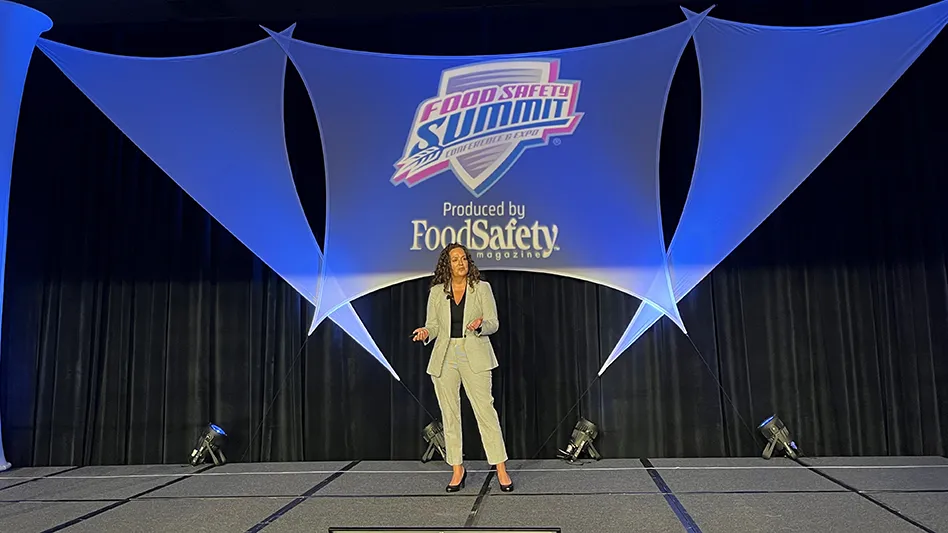
Logos courtesy IFT
CHICAGO — The Institute of Food Technologists (IFT) and Seeding the Future Foundation announced the Seed Grant winners and finalists for Growth Grants and Grand Prizes for the third annual Seeding the Future Global Food System Challenge. Seed Grants are awarded to organizations that create innovative ideas to transform food systems and have developed a prototype or initial proof of concept demonstrating that their idea is feasible and highly impactful when scaled.
The $1 million challenge, which received more than 900 submissions from 78 countries this year, is focused on high-impact innovations that lead to significant food system advances that support safe and nutritious food for a healthy diet, sustainable practices including regenerative agriculture and equitable access to food that is affordable, appealing and trusted by consumers.
The eight Seed Grant winners, each receiving $25,000, are as follows:
- Aquagenius: Small-scale Fish Farming Enhanced by a Circular Economy and Innovative, Eco-friendly Food Strategy (Republic of Benin). An efficient and ecologically responsible aquaculture feed system based on insect product that requires few resources and generates a small ecological impact. The system forms part of an integrated circular economy that values agriculture by-products and livestock residues for protein biomass.
- Feeding Albania Foundation: Sustainable Egg Production for NGOs and the Impoverished in Albania (Albania). The project focuses on building and distributing portable chickens’ coop packages for NGOs with land who feed the underserved and to provide sustainability and food security throughout Albania.
- Global Seed Savers: Empowering Communities for Sustainable, Equitable, Ecological and Diverse Food Systems through Seed Sovereignty (U.S.). The ECOSEEDS Project promotes seed-saving communities, seed production centers, seed entrepreneurship and farmer-consumer hubs to increase access to diverse locally adapted seed varieties and foster a reliable source of nutritionally rich crops.
- Ndalo Heritage Trust: Sorghum Value-addition: Scaling Up Nutrition, Human and Climate Health for At-risk Populations in Siaya County, Kenya (Kenya). This research project investigates the mineral bio accessibility of whole grain sorghum porridges fortified with acid-rich and beta carotene- rich plant foodstuffs to improve micronutrient status among at-risk consumers in Siaya County, Kenya.
- Safe Environment Hub: Black Soldier Fly Farming: Changing Trash to Cash (Kenya). The Black Soldier Fly farming project employs a circular economy approach to efficiently convert organic waste into biofertilizer (frass) and high protein feedstuff while significantly reducing greenhouse gas emissions.
- Tiny Seed Project: PISCES: Permaculture Institute, Cultivating Resistance: Promoting Cover Crops for Sustainable Agriculture in Northern Togo, West Africa (U.S.). The PISCES Permaculture Institute is planning to test and expand seed production for four potential cover crops in the Savanes Region of northern Togo to improve the fertility of the soil organically, with few imported inputs.
- Urban Being Inc.: JRDN-URBN: Building Food Autonomy into the City (Canada). JRDN-URBN’S mission is to better urban food systems. They have designed an innovative model of turnkey vertical tower farm plots that innovate upon existing commercial hydroponic technology to reconfigure and redesign usage for community and individual use and can be used year-round regardless of climate and weather considerations.
- UV4Good: UVC LED-based Systems to Clean Water in the Field and Other Emergency Situations Across the World (Ukraine). This project uses Novel UVC LED-based mobile water disinfectant systems that are compact and easily installed in water dispensing devices as plug-and-play water treatment systems for most point-of-use applications for emergency situations.
“We are thrilled about the quality, innovative nature and potential impact of this year’s Seed Grant winners,” said Bernhard van Lengerich, Ph.D., founder of Seeding the Future Foundation. “They demonstrate and embody the core intent of the challenge — impactful innovations that address the biggest challenges facing food systems across the globe. While we celebrate these eight deserving winners today, every team that submitted its project for consideration deserves our recognition and gratitude, as do the scientists, engineers and entrepreneurs out there doing their part to improve our global food system.”
IFT CEO Christie Tarantino-Dean added, “The Global Food System Challenge is truly one of the most inspirational and impactful food challenges being conducted, and its continued rise in popularity among top global innovators is incredibly gratifying, as their vision and commitment mirrors IFT’s mission of connecting global food system communities to promote and advance the science of food.”
The Growth Grant finalists and Grand Prize finalists have also been identified. Three Growth Grant winners will be awarded $100,000 each, while two Grand Prize winners will be awarded $250,000 each. Winners will be announced in January 2024.
Seeding The Future Grand Prize Finalists:
- Green America: Novel combination of Soil Carbon Initiative and Nutrient Density Alliance (U.S.)
- INMED South Africa: Scaling impactful Aquaponics Social Enterprise Program for marginalized communities (South Africa)
- International Food Policy Research Institute: Harvest Plus Program: Products from biofortified crops for School Feeding Programs (Kenya)
- Naandi Foundation: Transforming food systems through a novel ReGen Program (India)
- Savory Institute: Regenerating Maasai conservancies in Kenya’s Mara region (U.S.)
Growth Grant Finalists:
- Association 3535: Cool Lion Project: Solar powered refrigeration containers (Cote d'Ivoire)
- International Centre of Insect Physiology and Ecology: Plant Extract Based Biopesticides (Kenya)
- Ignitia: Climate Intelligence Solutions for Farmers in Tropical Regions (Sweden)
- Kopernik: PANGAN Initiative: Preserving Ancestral Knowledge and Revitalizing Food Security for a Climate-Resilient and Sustainable Future (Indonesia)
- Nurture Posterity International: NutriPosh: Nutritious composite flours integrated into innovative school feeding program (Uganda)
For more information on the challenge, visit www.ift.org/food-system-challenge.
Latest from Quality Assurance & Food Safety
- The Acheson Group Launches Podcast
- FDA Issues Update on Post-Market Assessment of Tara Flour
- ASI Announces Training Partnership with Rootwurks
- Nfinite Nanotech Closes $6.5 Million Seed Financing to Create Flexible Food Packaging with Nanotechnology
- University of Pretoria Food Science Student Wins IFT and PepsiCo’s Academic and Travel Undergraduate Hybrid Scholarship
- Kraft Natural Cheese and Shawn Johnson East Celebrate Launch of Kraft Signature Shreds
- Natural Sourcing International Announces Voluntary Recall of Black Chia Seeds
- PTNPA's DC Fly-In Connects Members with Policymakers





